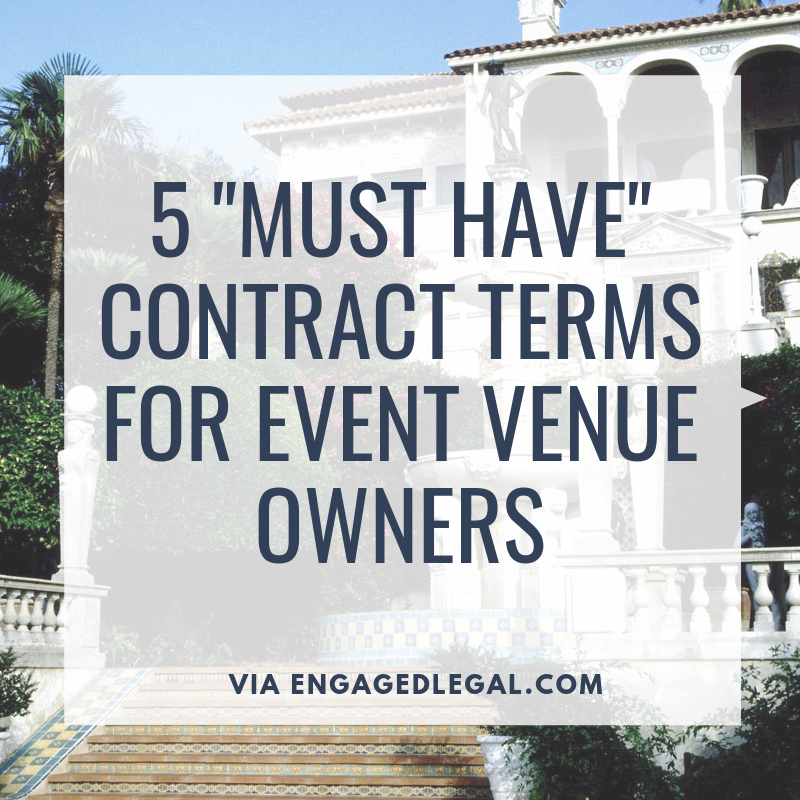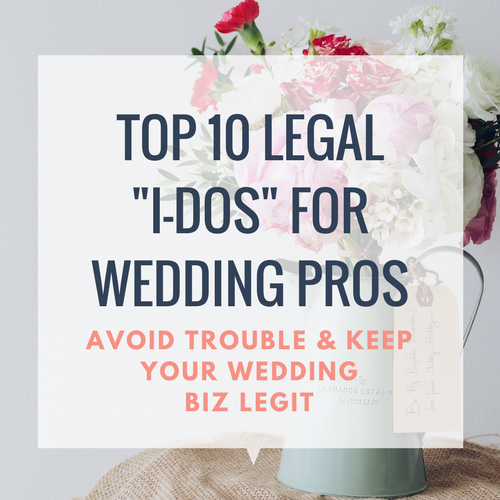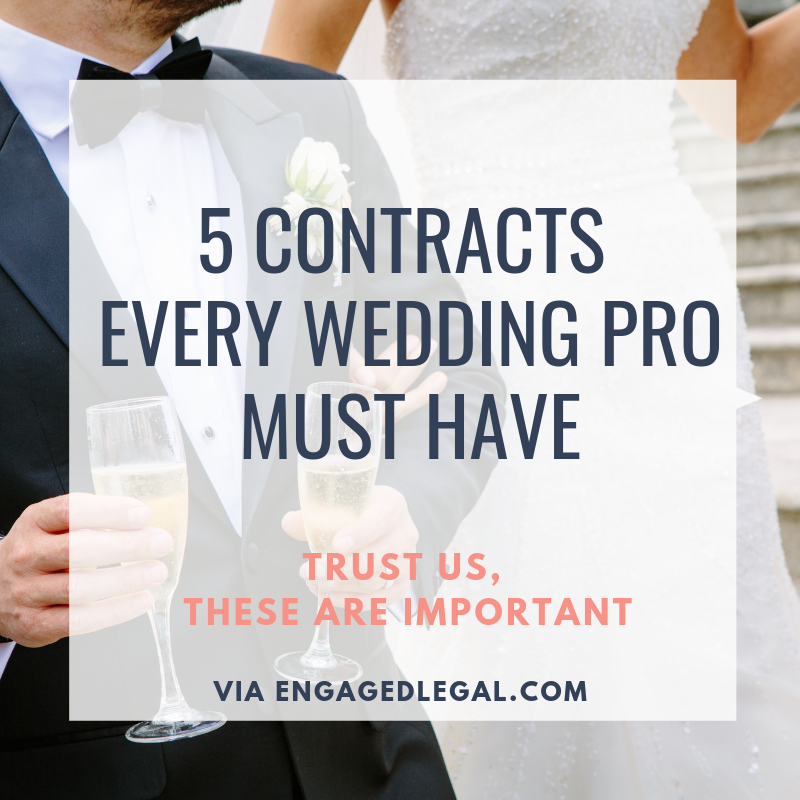5 Must-Have Contract Terms for Wedding and Event Venue Owners
/Hey Wedding Venue owners and Event Venue owners! You know how important it is to protect that valuable piece of real estate, but does your contract cover these types of “risky business?” Let’s walk through some of the little-thought-about areas you may need to revisit:
Insurance, Insurance, Insurance.
I can’t yell this one loud enough. Make sure your clients have wedding insurance and that you are named as an additional insured.
In addition to your own insurance policy— which you MUST get!— this additional insurance will give you extra protection . Event cancelled? Cool, you’re still paid. Someone gets a candle too close to the fire detector and the sprinklers go off, ruining the gifts and the wedding gown? Insurance can cover this. The bride or groom gets deployed? You’ll still get paid for that event date.
Want more info on wedding insurance? My lovely guest post from Hunter will give you some of the good stuff.
2. Did someone say FIRE?
If you are an old venue, a venue in a place where droughts or common, a farm/ stable with live animals nearby, or just worried about drunk people catching things on fire with sparklers, this one’s for you.
You can reserve the right to limit candles, fire, sparklers, etc. on your property. You can totally outlaw fire that makes you “nervous” (cough cough SPARKLERS) or you can just limit candles and other open flames during riskier dry months. Got an old wooden barn? Think about a 25-foot “no fire” zone around the building. Concerned about the lack or rain? Tell them Smokey the Bear says NO FIRE until the weather changes. You are the owner of the property, and what you say goes.
In fact, your insurance policy might require limiting open flames, so make sure you talk to your insurance agent to determine what is and isn’t “ok” under your policy.
3. An Enforceable Nonrefundable Deposit Clause
You want to write in an enforceable non-refundable deposit clause to your contract in order to reserve the date. Notice I said “enforceable.”🧐
The issue here is that a lot of states reeeeeeeaaaaally don’t like nonrefundable deposits. Wait, WHAT?!
Yep, you read that right. The legal system actually likes people to be able to get in and out of contracts as they want to— even though that sounds counter intuitive.
So really, nonrefundable deposits are an uphill battle from square one.
That’s why you need to draft a non-refundable deposit clause that doesn’t look like a penalty for cancellation, and instead looks like a way to compensate you for the time you’ve spent putting in work procuring needed labor or materials for the event, OR to compensate you for taking that day out of your availability. 💵💵💵
The term “liquidated damages” is a “magic word” here that helps set up this type of payment structure. And while this language isn’t a guarantee you’ll be able to keep the entire fee if the couple cancels, you are setting yourself up the best you can.
Keep in mind that if you can re-rent the property on that date, you probably won’t be able to keep the entire fee. That’s possibly considered overkill, and ya can’t have cake and eat it too for that rental day!. BUT you will likely be able to keep the non-refundable deposit.
4. MODEL RELEASE
Here’s the truth: to use a photograph or image (or “likeness”) of someone in relation to your business, you need an Image Release, also known a a Model Release.
This includes your blog, social media, marketing materials, ads, client spotlights, website photos, portfolio, ANYTHING at all related to your business.
Without this permission, the individual can sue you for misappropriation of their image and likeness.
You need to get in writing irrevocable (they can’t “take it back”) client permission to use their “image and likeness” throughout all mediums you will be using. I put these in every contract I write, so the Couple signs off as part of their event.
However, don’t forget to get guests to sign off too if you know you’ll be using photos from this event in your portfolio (yes, I know it’s a pain, but don’t shoot the messenger here). The couple can’t sign off on their guests’ behalf! So if you shoot a great photo of that little flower girl bustin a move on the dance floor and you want to slap that up on your portfolio…… go find mom, pull out a digital release form, and get her to sign a model release.
Tip From Experience: this gets more and more critical the higher dollar value the event, or if the event involves individuals who are celebrities or public figures. Their people will be on you like white-on-rice if you use an image of a celeb on your social media promoting your business.
[Another tip— if you don’t have a Model Release, we have one in the shop as well]
5. Alcohol Rules
Alcohol laws differ from state to state. Some states are locked-down ABC states, while others are like the wild wild West and anything goes.
And to make it crazier, localities may have local regulations regarding alcohol. For example, in my hometown, you can buy alcohol on Sunday. The next county over? Nope.
It’s critical that you know WHO is in charge of getting a license to serve alcohol, HOW that must be done, WHERE that alcohol must come from (Can you purchase from licensed distributors only? Can the couple just go to Costco? This all changes from location to location!) and WHO must serve it. Note these in your contract.
And YOU, my venue friends, need to know your liability as a location, because in 38 STATES there is this grand old thing called “Dram Shop Liability” which makes a business which sells alcoholic drinks or a host who serves liquor to a drinker who is obviously intoxicated or close to it, strictly liable (legalease, hang in there an I’ll explain it) to anyone injured by the drunken patron or guest.
“Strictly liable” means that if it happens, you’re guilty. Period. Not trying to get dramatic here, but you know how if someone has sex with a minor, it’s automatically statutory rape? That’s strict liability.
Here, if a guest of an event is visibly overserved, you could be liable for the destruction they sow on the way home/ after the event. Making sure your contract 1) allows you to stop serving guests at any time, 2) requires bartenders to stop serving 1 hour in before the event ends so folks can sober up, and 3) explicitly pushes off as much liability as possible onto the couple (for example, by requiring the couple bring in their own bartenders or procure their own banquet license). Similarly, using contractual tools like an indemnity clause helps here.
A note on indemnification clauses: They aren’t a magic “cure all.” You can still be held technically liable, but the client will be in charge of paying for your defense and legal fees. If they can’t pay the legal fees or a $2 mil verdict / are bankrupt, this creates issues for you! So don’t look at indemnification as a “get out of jail free” card!
Cleanup or Cleanup Fee
This might seem obvious, but it often gets overlooked. Who is in charge of cleanup? Make your clients initial next to the dotted line if THEY are in charge of removing waste. And if there’s an additional cleanup fee, make sure you get their signature next to that detail as well. That way, there’s NO way they can say they “didn’t know!” that they were in charge of getting that
——-
Oh yeah, and remember, we have a Venue Rental Contract Template here in case you need it. We also have a Wedding and Event Venue Termination Contract Template, because sometimes, things fall through. I GOT YA.
[Note: this is part of our series on Must Have Contract Clauses for Wedding Pros. You can find the following articles here, and send them to your Wedding Pro friends!



















